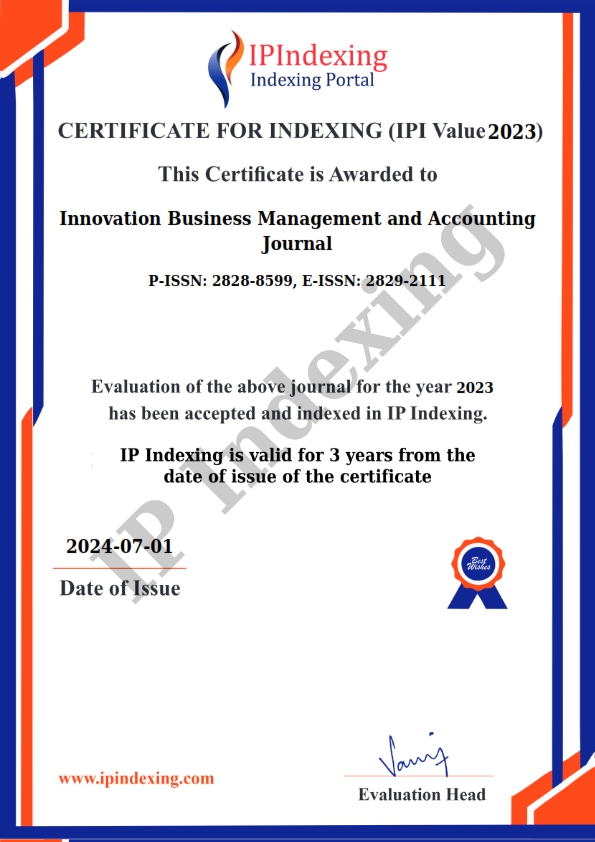Community Participation in the Development Planning Process of the Village Area
DOI:
https://doi.org/10.56070/ibmaj.2024.017Keywords:
Community Participation, Development Planning, Regional GovermentAbstract
The implementation of mandatory actions required by Law No. 23 of 2014 concerning Regional Government, Article 150, mandates that development planning is a mandatory affair. Development planning as carried out in Sekeloa Sub-District is through a participatory planning process known as "musrenbang", which begins with a sub-district-level deliberation and continues at the district-level musrenbang. This research aims to define and analyze the process of sub-district development planning, community involvement, as well as the variables that drive and hinder it. The research methodology employs an interactive qualitative data analysis model for descriptive research with a qualitative approach. The findings of this research indicate active community involvement in the musrenbang of Sekeloa Sub-District. In this phenomenon, the community and the government collaborate in Sekeloa Sub-District to plan for future growth. The active participation of both the community and the government in the development planning process of Sekeloa Sub-District highlights a collaborative effort towards sustainable growth and development. This partnership underscores the importance of inclusive decision-making and community empowerment in shaping the future of the locality.
Downloads
References
Akbar, A., Flacke, J., Martinez, J., & van Maarseveen, M. F. (2020). Participatory planning practice in rural Indonesia: A sustainable development goals-based evaluation. Community Development, 51(3), 243-260. https://doi.org/10.1080/15575330.2020.1765822
Auriacombe, C. J., & Sithomola, T. (2020). The use of participatory action research in a participative democracy: In critique of mechanisms for citizen participation. International Journal of Social Sciences and Humanity Studies, 12(1), 50-65.
Bappeda Kota Bandung. (2018). Rencana Pembangunan Jangka Menengah Daerah (RPJMD) Kota Bandung 2018-2023. Kota Bandung :Bappeda Kota Bandung.
Carayannis, E. G., & Morawska-Jancelewicz, J. (2022). The futures of Europe: Society 5.0 and Industry 5.0 as driving forces of future universities. Journal of the Knowledge Economy, 13(4), 3445-3471. https://doi.org/10.1007/s13132-021-00854-2
Clausen, L. T., & Rudolph, D. (2020). Renewable energy for sustainable rural development: Synergies and mismatches. Energy Policy, 138, 111289. https://doi.org/10.1016/j.enpol.2020.111289
Damayanti, R., & Syarifuddin, S. (2020). The inclusiveness of community participation in village development planning in Indonesia. Development in Practice, 30(5), 624-634. https://doi.org/10.1080/09614524.2020.1752151
Derunova, E., Kireeva, N. Y., & Pruschak, O. (2020). The role of state support in ensuring the inclusive development of the agri-food system. Scientific Papers Series Management, Economic Engineering in Agriculture and Rural Development, 20(1), 161-172.
Errichiello, L., & Micera, R. (2021). A process-based perspective of smart tourism destination governance. European Journal of Tourism Research, 29, 2909-2909. https://doi.org/10.54055/ejtr.v29i.2436
Fu, Y., & Ma, W. (2020). Sustainable urban community development: A case study from the perspective of self-governance and public participation. Sustainability, 12(2), 617. https://doi.org/10.3390/su12020617
Gunbayi, I., & Sorm, S. (2020). Social Paradigms in guiding management social development and social research. Ankara: Pegem Academy.
Jebran, K., & Chen, S. (2023). Can we learn lessons from the past? COVID‐19 crisis and corporate governance responses. International Journal of Finance & Economics, 28(1), 421-429. https://doi.org/10.1002/ijfe.2428
Kiss, B., Sekulova, F., Hörschelmann, K., Salk, C. F., Takahashi, W., & Wamsler, C. (2022). Citizen participation in the governance of nature‐based solutions. Environmental Policy and Governance, 32(3), 247-272. https://doi.org/10.1002/eet.1987
Koumachi, B. (2021). Evaluating the evaluator: Towards understanding feed-back, feed-up, and feed-forward of Moroccan Doctorate supervisors’ reports. International Journal of Research in English Education, 6(4), 91-105. https://doi.org/10.52547/ijree.6.4.91
Lo, Y. C., & Janta, P. (2020). Resident’s perspective on developing community-based tourism–a qualitative study of Muen Ngoen Kong Community, Chiang Mai, Thailand. Frontiers in Psychology, 11, 552922. https://doi.org/10.3389/fpsyg.2020.01493
Luger, T. M., Hamilton, A. B., & True, G. (2020). Measuring community‐engaged research contexts, processes, and outcomes: a mapping review. The Milbank Quarterly, 98(2), 493-553. https://doi.org/10.1111/1468-0009.12458
Newell, R., Picketts, I., & Dale, A. (2020). Community systems models and development scenarios for integrated planning: Lessons learned from a participatory approach. Community Development, 51(3), 261-282. https://doi.org/10.1080/15575330.2020.1772334
Nurdin, N. H., Asang, S., & Susanti, G. (2021, July). Development Planning Deliberatif. In 2nd International Conference on Administration Science 2020 (ICAS 2020) (pp. 258-264). Atlantis Press.
Putri, A. E., Khadijah, U. L. S., & Novianti, E. (2020). Community empowerment in the development of mangrove tourism in Batu Karas of Pangandaran, West Java. Geo Journal of Tourism and Geosites, 31(3), 972-978.
Sari, N. H. (2022). Communication approaches for participatory planning and civic engagement in sustainable governance systems: a study of social communicative behaviour in Indonesia (Doctoral dissertation).
Sopanah, A., Bahri, S., & Ghozali, M. (2021). Community Empowerment in Batu Tourism City Through Local Wisdom- Based Creative Economics Proceedings of the 1st International Conference on Social Science, Humanities, Education and Society Development, ICONS 2020, 30 November, Tegal, Indonesia,
Sopanah, A., Harnovinsah, & Sulistyan, R. B. (2023). Madura Indigenous Communities' Local Knowledge in the Participating Planning and Budgeting Process. Jurnal Ilmiah Akuntansi dan Bisnis, 18(1), 163-178. https://doi.org/10.24843/JIAB.2023.v18.i01.p11
Sopanah, A., Harnovinsah, H., Sulistyan, R. B., & Mulyono, M. (2023). Job Relevant Information: Model Partisipasi Penyusunan Anggaran, Kinerja Manajerial Dan Budgetary Slack. Jurnal Reviu Akuntansi dan Keuangan, 13(1), 18-34. https://doi.org/10.22219/jrak.v13i1.25321
Sulistyan, R. B. (2020). Lecturer E-learning Training: The Role of Social Exchange Theory. Empowerment Society, 3(2), 50-56. https://doi.org/10.30741/eps.v3i2.589
Temeljotov Salaj, A., Gohari, S., Senior, C., Xue, Y., & Lindkvist, C. (2020). An interactive tool for citizens’ involvement in the sustainable regeneration. Facilities, 38(11/12), 859-870. https://doi.org/10.1108/F-09-2019-0099
Woost, M. D. (2020). Alternative vocabularies of development?‘Community’and ‘participation’in development discourse in Sri Lanka. In Discourses of development (pp. 229-253). Routledge.
Yudarwati, G. A., & Gregory, A. (2022). Improving government communication and empowering rural communities: Combining public relations and development communication approaches. Public Relations Review, 48(3), 102200. https://doi.org/10.1016/j.pubrev.2022.102200
Downloads
Published
How to Cite
Issue
Section
License
Copyright (c) 2024 Ahmad Ahmad, Barkah Rosadi, Susniwati Susniwati

This work is licensed under a Creative Commons Attribution-ShareAlike 4.0 International License.



